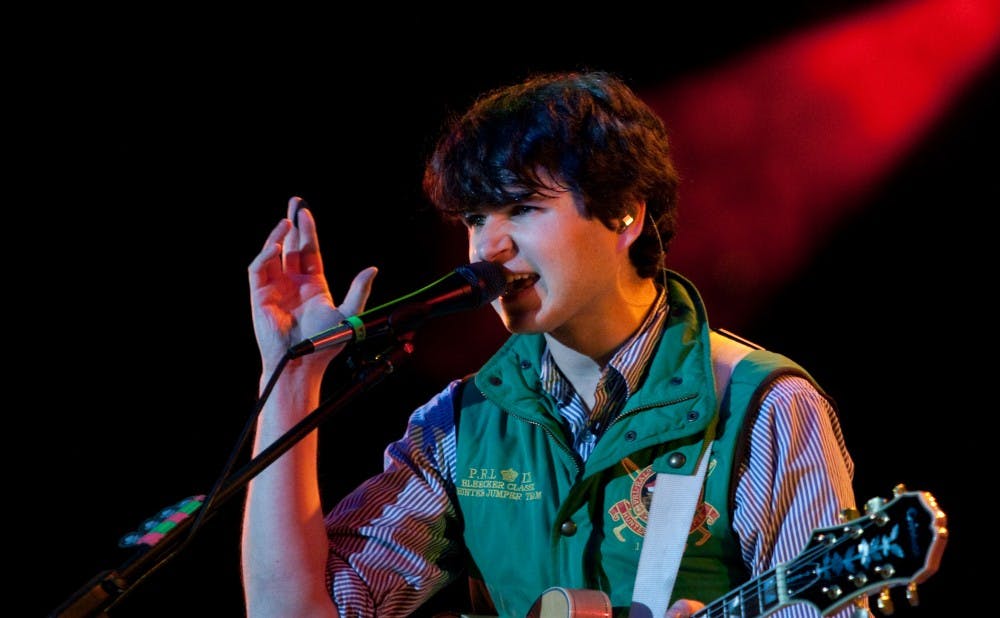It’s been a busy six years for Ezra Koenig. In the time since his band released the critically-acclaimed “Modern Vampires of the City” in 2013, the frontman has hosted his own radio show on Beats 1, wrote and produced a Netflix anime series, had a child, stumped for Bernie Sanders, nabbed a production credit on Beyoncé’s “Lemonade” and seemingly everything in between. The one thing missing? Another Vampire Weekend album, whose progress — as documented in spurts by Koenig since he hinted at the working title “Mitsubishi Macchiato” back in 2016 — lurched from 80 percent to “94.5 percent” and finally to 100 percent over the span of the last three years. Not since Frank Ocean’s “Blonde” has the wait for an album provoked so much anticipation.
One has to believe that Koenig feels the pressure, too, and no one could have blamed him for quitting while he was ahead. With the departure of producer and multi-instrumentalist Rostam Batmanglij in 2016, who was equally responsible for the sound the band forged through its first three albums, the future of Vampire Weekend, for a time, seemed very much in doubt. Squarely at the reins of the project, it was unclear how Koenig would adapt. Now we have the answer: “Father of the Bride,” an 18-song double-album that, in its sheer size, more than rewards its years of waiting.
Coming at the cusp of summer, the record’s release arrives nearly six years to the date after “Modern Vampires of the City.” But while the meditations on religion, death and doubt that graced “Modern Vampires” evoked a foggy Manhattan winter, “Father of the Bride” finds this quintessentially East Coast band in California, and it’s far more suited to its billing as a summer album. Koenig has never lacked for wit — and even on “Modern Vampires,” Vampire Weekend couldn’t be described as dour — but the unrelenting sunniness on this record is certainly a new look. Koenig pursues it through a newfound spirit of collaboration (Danielle Haim, Steve Lacy, Mark Ronson, Jenny Lewis and Dave Longstreth make up part of the guest list) and looser, freer arrangements carried by dense production. It’s an album that sounds like it was as fun to make as it is to listen to, and that’s usually (but not always) a good thing.
The ethos of “Father of the Bride” is perhaps best summed up by the Steve Lacy voiceover that begins the track “Sympathy”: “I think I took myself too serious. It’s not that serious.” Indeed, tracks like “This Life” and “We Belong Together” — one of three pleasantly surprising duets with Danielle Haim — venture into outright camp, expertly toeing (and sometimes crossing) the line between sincerity and tackiness. The chirpy, “Brown Eyed Girl”-aping guitars of the former, for one, are ridiculous on paper, but if you have a soul, it’s impossible not to be at least a bit moved when Koenig sings, “Baby, I know pain is as natural as the rain / I just thought it didn’t rain in California.” On the other hand, “We Belong Together,” with its laundry list of fill-in-the-blank similes traded between Koenig and Haim, is cloying in its sweetness and more than a little corny. Along with the peppy horns that punctuate the subsequent track, “Stranger,” it is one of a few moments on “Father of the Bride” where it seems the record could have benefited from some editing. On an 18-song album, after all, there are bound to be some duds.
One gets the sense, though, that the excess is the point, or at least an unavoidable side effect of the looser approach in the studio. Influences collide from every angle on “Father of the Bride,” and if the album doesn’t boast as many immediate earworms as “Contra” or “Vampire Weekend,” it certainly doesn’t lack for flourishes of production. It’s an entertaining experience of its own simply to trace the sheer variety of sounds and reference points that cross the surface of the album.
Even the first single, “Harmony Hall,” pulls a sly trick of self-plagiarism, its refrain relying heavily on a line from “Finger Back,” an underappreciated cut from “Modern Vampires of the City.” The Danielle Haim duets, meanwhile, are the closest Vampire Weekend has ever gotten to country, but “Married in a Gold Rush” — the strongest of the three — is indebted as much to disco as to Sonny and Cher. “Sunflower” takes CAN’s “Halleluhwah” and pairs it with a scatting Steve Lacy, while “Big Blue” starts with a minimalist R&B fake-out before sliding, multi-tracked guitars transform the track into what could be a “Jesus Christ Superstar” deep cut. “Unbearably White” could have been an outtake from fellow New York indie rockers Dirty Projectors’ “Swing Lo Magellan,” while “Rich Man” and “2021” ride crate-digging loops that nod to hip-hop. The final track, “Jerusalem, New York, Berlin,” scans as a standard piano-ballad album closer à la “Young Lion,” but the rave-like bass line that bubbles from under the surface keeps things interesting. At times, as on the overstuffed “Harmony Hall,” all this indulgence can be overwhelming, like a haphazard substitute for original ideas, but as often as not, it’s a treat. (Fittingly, it’s the comparatively minimalist tracks on this album — like “2021” and “Big Blue” — whose novelty demands the most replays.)
Like the White Album or “The Life of Pablo” before it, “Father of the Bride” trades economy for excess, and if the results are mixed, then perhaps it’s by design. At its best, the album stares cynicism in the face and stubbornly breaks down its defenses — a move that, in 2019, feels almost radical. After six years of silence from Vampire Weekend, there’s enough here, at least, to satisfy the next few summers.
Get The Chronicle straight to your inbox
Signup for our weekly newsletter. Cancel at any time.

